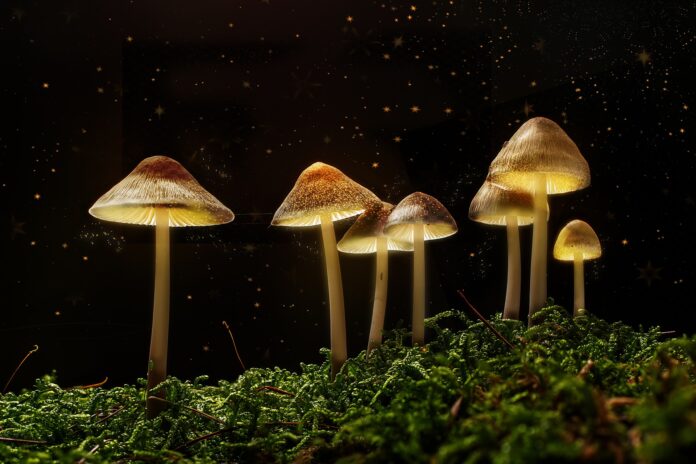Increasingly science is coming to the defence of recreational natural drugs. Outlawed in most countries, marijuana has already been found to have medical benefits. Now a recent study has revealed that a single dose of the psychedelic substance psilocybin, the active compound in magic mushrooms, can significantly reduce symptoms of major depression for up to six weeks. The study, which appeared in JAMA on August 31, demonstrated that individuals who received psilocybin experienced more substantial improvements in their depression scores compared to those who were administered a placebo lacking psychedelic properties.
Coupled with psychological support, Psilocybin not only led to reduced depression symptoms but also showed positive effects on overall disease severity, anxiety symptoms, and quality of life. Importantly, unlike conventional antidepressant medications, psilocybin did not induce “emotional blunting,” where individuals become emotionally numb to both positive and negative feelings.
This study adds to the growing body of evidence suggesting that psilocybin, when combined with psychological support, could offer an alternative treatment for people with major depressive disorder, potentially replacing or supplementing traditional antidepressants.
Impacts clinical depression
The research, while relatively small in scale, demonstrated that a single dose of psilocybin, within a six-week framework that included active psychotherapy, resulted in a rapid, robust, and sustained reduction in depressive symptoms. This observation was noted by Rachel Yehuda, PhD, and Amy Lehrner, PhD, from the Icahn School of Medicine at Mount Sinai, in an accompanying editorial.
Major depressive disorder, commonly known as clinical depression, is a significant medical condition affecting mood, behaviour, and physical functions such as appetite and sleep. It is usually treated with antidepressant medications, which can improve symptoms in a substantial portion of individuals with moderate or severe depression within six to eight weeks. However, these medications often come with side effects, including headaches, dizziness, and sexual problems, which can deter patients from continuing their treatment.
In recent years, researchers have explored the use of psychedelics like psilocybin as a potential treatment for depression and other mental health conditions. In this phase 2 clinical trial published in JAMA, researchers aimed to address previous limitations in psilocybin research, such as small sample sizes and the potential for participants and researchers to discern whether psilocybin or placebo was administered.
The study included 104 participants aged between 21 and 65, all meeting the criteria for major depressive disorder but otherwise in good health. Approximately half of the participants were women, and most were white. The study took place at 11 sites across the United States between 2019 and 2022. Participants were carefully screened, and those with certain conditions, such as moderate or severe alcohol use disorder, recent psychedelic use, or suicidal thoughts, were excluded.
Participants were randomly assigned to receive either a single oral dose of 25 milligrams of psilocybin or 100 milligrams of niacin. Niacin was used as an active placebo, as it lacks psychedelic effects but causes a harmless skin flush. This choice minimized the chances of participants and researchers guessing which compound was administered.
Depression symptoms were assessed at various intervals, and participants were also questioned about anxiety symptoms, side effects, and their quality of life, all through telephone assessments to maintain participant anonymity.
Significantly greater improvements
The study, sponsored by the Usona Institute Inc., a nonprofit medical research organization, demonstrated that after six weeks, those who received psilocybin experienced significantly greater improvements in their depression symptoms compared to the niacin group. This improvement was substantial and comparable to what is considered “substantial clinical improvement” in individuals with treatment-resistant depression. Notably, the positive effects of psilocybin became apparent within eight days of dosing and persisted throughout the six-week follow-up period.
However, it’s essential to recognize that not all participants responded equally to psilocybin, as seen in previous research. Dr. Manish Sapra, a psychiatrist and executive director for behavioral health services at Northwell Health, pointed out that psilocybin may not work for everyone, but even if it benefits a fraction of individuals, it could still represent a valuable addition to the treatment options for depression.
The study also found that psilocybin was generally well-tolerated, with most side effects being mild or moderate in severity and short-lived. Common side effects included headaches, nausea, and hallucinations, which were primarily experienced on the day of dosing and had resolved by the end of the study.
Study limitations
However, the study had its limitations, including a lack of ethnic and racial diversity among participants, which makes it challenging to generalize the results to other groups. Additionally, the study did not investigate whether the benefits of psilocybin extend beyond the initial six weeks. Previous research suggests that the effects may persist for at least a year after dosing.
While these findings are promising, further research in the form of longer-term trials is necessary to assess the sustainability of the improvements seen with psilocybin. Such studies could also determine whether patients require repeated or maintenance treatments with psilocybin to maintain the benefits.
If psilocybin receives approval from the Food and Drug Administration as a treatment for major depression, ongoing studies in real-world settings will provide additional data on its safety and effectiveness, helping to shape its role in the treatment of this challenging condition.


